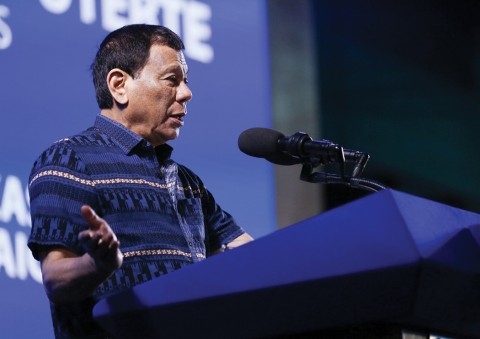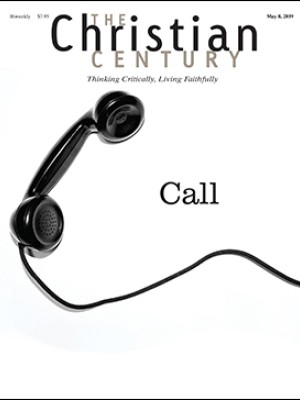The Philippines is 80% Catholic. President Duterte is ferociously anti-Catholic.
How on earth did this happen?

When it comes to the relationship between Christianity and politics, the Philippines is an anomalous case. It is a nation with one of the world’s largest Christian populations—which is destined to grow mightily in coming decades—and the evidence of widespread Catholic piety is easy to see. Yet in the past few years, the country has acquired a regime that speaks the language of ferocious anti-Catholicism and anticlericalism. How on earth did this happen?
With a population of 105 million, the Philippines is at least 80 percent Catholic, with another 10 to 15 percent Protestant. It is already one of the world’s two or three largest centers of Catholic population, and by 2050 the country will likely be home to 120 million Catholics.
Read our latest issue or browse back issues.
That Catholic bedrock is obvious at events like the annual pilgrimage and procession in Manila associated with the image of the Black Nazarene. This past January, this astonishing gathering, called the Traslación, attracted some 5 million of the faithful. By way of comparison, that is roughly double the number of Muslims who travel each year to Mecca for their more celebrated pilgrimage, the Hajj. And the Traslación is only one of the great festivities that make up the thriving ritual year around the country. The Marian shrine of Baclaran is an overwhelming attraction.
Politically, the Catholic Church has always played a vital role in the country, and it was critical to the overthrow of the dictatorship of Ferdinand Marcos in 1986. The country’s late Cardinal Jaime Sin made and broke more than one regime, and he spoke powerfully for human rights causes. One could be forgiven for assuming that the country’s politics had not moved too far from the world of the Catholic Reformation, some four centuries ago.
All of which should be borne in mind when considering the turmoil that has overtaken the country since 2016, when Rodrigo Duterte gained the presidency with 39 percent of the vote. Duterte is a classic strongman politician. An outspoken populist, an authoritarian, and a demagogue, he calls publicly for death squads to solve the problems of violent crime and drug dealing by extrajudicial killings. He is a nightmare for human rights activists.
What have been most surprising are his outspoken attacks on the Catholic Church, all the more so since a great many Catholics must have cast their ballots for him. Beyond attacking particular prelates, he has condemned the whole institution, including clergy at all levels.
In a series of sulfurous tirades, Duterte has denounced the church as a haven of corruption, with a special focus on sexual sins—child abuse, the rape of nuns, and the tolerance of pederasty. Bishops are “useless fools.” He offered an apocalyptic prophecy: “The Catholic Church? In about 25 years, it will disappear. No more. People will forget it.” His attacks extend to Christian theology, including what he claims as the absurdity of the idea of original sin. God, he feels, is “stupid.”
In his religious views, as in so much else, Duterte’s motivations are hard to judge. He says he was molested by a priest as a child, but he has plenty of practical disagreements with the Catholic Church on issues like capital punishment and contraception: he is strongly in favor of both, while the church opposes both. The more the clergy try to stem police abuses and violence, the more easily they can be targeted as accomplices of the lethal drug gangs.
Beyond these considerations, Duterte presumably feels that a steady diet of outrage flavored with salacious rhetoric is an excellent means of remaining in the daily headlines. At the same time, he is opposing comfortable elites who appear far removed from the country’s poor. If you want to challenge a country’s entrenched elite, then in the Philippines that has to mean attacking the church and its hierarchy. In a country with so much poverty, charges of clerical hypocrisy seem all too plausible. Even the wildest harangues help cement the loyalty of the leader’s hard-core followers.
Whatever the roots of his rage, Duterte’s rhetoric is truly dangerous in its real-world consequences. His calls for vigilantism have inspired a great many murders, running into the thousands. There is every reason to expect that his shrieking anticlericalism might likewise lead to direct assaults on churches and priests and even to widespread acts of persecution. Several priests have already been murdered.
The Duterte phenomenon might not outlast his presidency, but he has set some alarming precedents. By targeting the hierarchy and the clergy, he has shown the way for future demagogues to attack and plunder the church without necessarily offending the piety of ordinary believers who so faithfully follow the statues of the Christ and the Virgin and who patronize the pilgrimages. The precedent is troubling. If this can happen in the Philippines, what other country can feel safe?
A version of this article appears in the print edition under the title “A Filipino anti-Catholic president.”







